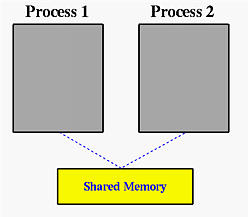
The system call that requests a shared memory segment is shmget(). It is defined as follows:
shm_id = shmget(
key_t k, /* the key for the segment */
int size, /* the size of the segment */
int flag); /* create/use flag */
In the above definition, k is of type key_t or
IPC_PRIVATE. It is the numeric key to be assigned to the returned
shared memory segment. size is the size of the requested shared
memory. The purpose of flag is to specify the way that the shared
memory will be used. For our purpose, only the following two values are
important:
If shmget() can successfully get the requested shared memory, its function value is a non-negative integer, the shared memory ID; otherwise, the function value is negative. The following is a server example of requesting a private shared memory of four integers:
#include <sys/types.h>
#include <sys/ipc.h>
#include <sys/shm.h>
#include <stdio.h>
.....
int shm_id; /* shared memory ID */
.....
shm_id = shmget(IPC_PRIVATE, 4*sizeof(int), IPC_CREAT | 0666);
if (shm_id < 0) {
printf("shmget error\n");
exit(1);
}
/* now the shared memory ID is stored in shm_id */
If a client wants to use a shared memory created with IPC_PRIVATE, it must be a child process of the server, created the parent has obtained the shared memory, so that the private key value can be passed to the child when it is created. For a client, changing IPC_CREAT | 0666 to 0666 works fine. A warning to novice C programmers: don't change 0666 to 666. The leading 0 of an integer indicates that the integer is an octal number. Thus, 0666 is 110110110 in binary. If the leading zero is removed, the integer becomes six hundred sixty six with a binary representation 1111011010.
Server and clients can have a parent/client relationship or run as separate and unrelated processes. In the former case, if a shared memory is requested and attached prior to forking the child client process, then the server may want to use IPC_PRIVATE since the child receives an identical copy of the server's address space which includes the attached shared memory. However, if the server and clients are separate processes, using IPC_PRIVATE is unwise since the clients will not be able to request the same shared memory segment with a unique and unknown key.
Suppose process 1, a server, uses shmget() to request a shared memory segment successfully. That shared memory segment exists somewhere in the memory, but is not yet part of the address space of process 1 (shown with dashed line below). Similarly, if process 2 requests the same shared memory segment with the same key value, process 2 will be granted the right to use the shared memory segment; but it is not yet part of the address space of process 2. To make a requested shared memory segment part of the address space of a process, use shmat().
